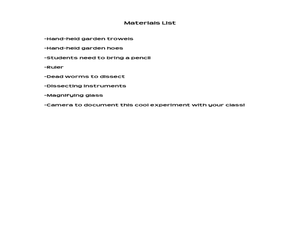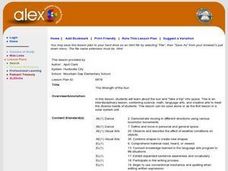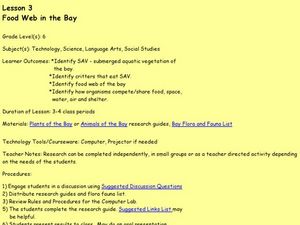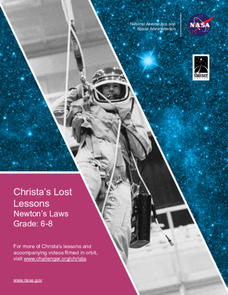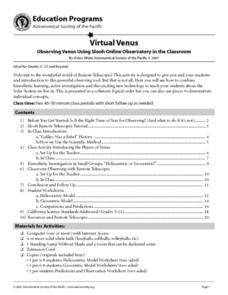Curated OER
Understanding Air Pressure
Fifth graders complete experiments with air to understand that air takes up space, has mass, and that air pressure can be changed. In this air pressure lesson, 5th graders test the air pressure by using balloons, syringes, and water to...
Curated OER
A Science Trail: Worms
Third graders explore worms in multiple ways. In this lesson on worms, 3rd graders search for worms in their natural environment, record data on worms, and dissect worms.
Curated OER
Animal Morphs
Learners explore animal drawing. In this cross curriculum drawing, photography, and animals lesson plan, students combine computer drawing and freehand drawing to create an animal and its environment using a photograph of...
Curated OER
Outer Space Creature
Students read poems by Shel Silverstein about planets and outer space. As a class, they compare and contrast his descriptions to actual facts which have been discovered through explorations. They write a description of an outer space...
Curated OER
Why is There a Tidal Bulge Opposite the Moon?
Students simulate how the Moon causes ocean tides. In this earth science lesson, students calculate gravitational acceleration using a mathematical formula. They compare the force of attraction between the Earth, Moon and Sun system.
TLS Books
Space Shuttle
What do your pupils know about the space shuttle? They can find out more by reading this information sheet that chronicles the history and function of the space shuttle. The resource includes a brief timeline in addition to the...
Alabama Learning Exchange
The Strength of the Sun
Students explore the sun and take a "trip" to outer space.
Curated OER
Multicultural Sun, Moon, and Star Activities
Students research the multicultural stories and artistic representations of the Sun, Moon, and stars. In this multicultural space lesson, students discuss the symbols and stories for the sun in various cultures. Students construct a...
Curated OER
How Does Flowing Water Shape a Planet's Surface?
Students investigate how flowing water influence landforms. In this earth science lesson, students observe water behavior as it flows from the stream table at various inclinations. They discuss whether water shaped Mars landforms or not.
Curated OER
Goldilocks and the Three Hares
Students read the book Goldilocks and the Three Hares and complete activities to go along with it. In this Goldilocks and the Three Hares lesson plan, students complete activities on puns, facts about weasels, rabbits and hares, and more.
Habitat Conservation Trust Foundation
Greenhouse Gas Game
You will need to gather a number of tokens, bags, and other various game components in order to incorporate this activity into your curriculum. Different tokens represent carbon dioxide, methane, and nitrous oxide. Printable 8.5"x11"...
Curated OER
Food Web in the Bay
Sixth graders study the food web in a bay. In this food web lesson plan, 6th graders investigate the SAV- submerged aquatic vegetation of a bay including their predators, and how the organisms eat, have proper living space and water....
University of Colorado
Distance = Rate x Time
Every year, the moon moves 3.8 cm farther from Earth. In the 11th part of 22, classes use the distance formula. They determine the distance to the moon based upon given data and then graph Galileo spacecraft data to determine its movement.
NASA
Christa's Lost Lesson: Newton’s Laws
How do the laws of motion work in space? Learners explore Newton's laws of motion in different experiments as part of the Christa's Lost Lessons series. They rotate around the room in three stations to experience each law in action using...
Rainforest Alliance
Knowing the Essential Elements of a Habitat
To gain insight into the many different types of habitats, individuals must first get to know their own. Here, scholars explore their school environment, draw a map, compare and contrast their surroundings to larger ones. They then...
BioEd Online
Muscle Fibers
What better way to learn about muscle than by dissecting one? Using cow muscle (beef), learners compare bundles of yarn to muscle fibers as they explore each. The supplemental reading about astronauts losing muscle mass in space and what...
NOAA
Marine Ecosystems
Be at the top of the food chain when it comes to understanding marine ecosystems. The 21st installment of a 23-part NOAA Enrichment in Marine sciences and Oceanography (NEMO) program investigates marine ecosystems, ocean zones, and food...
Curated OER
Virtual Venus
Students practice using the tool of remote telescopes in order to make observations in space. The lesson includes the best times of year to make observations. They use the internet to obtain information and to initiate the use of the...
University of Colorado
The Moons of Jupiter
Middle schoolers analyze given data on density and diameter of objects in space by graphing the data and then discussing their findings. This ninth installment of a 22-part series emphasizes the Galilean moons as compared to other...
Columbus City Schools
Keeping It Hot!
Hot off the presses, this collection of thermal energy activities, lessons, and printables is sure to amaze. Demonstrate how thermal energy moves about in a system using simple materials. Pupils demonstrate their understanding...
NASA
Introduction to Real Air Traffic Control—Problem Set A
Understand what it takes to control planes safely. The first lesson in a series of six introduces the class to the air traffic control situation. The pupils develop their understanding of units used in air travel, then learn how to read...
Curated OER
Cut-off Genes
Investigate the relationships between different deep-sea organisms by DNA sequencing. A worksheet provides instructions for DNA sequencing and space to work. They simulate gel electrophoresis by cutting out paper "DNA strands."...
Curated OER
Target Earth
Space scientists use water displacement to determine the mass of a cubic centimeter mini meteorite, and then use it as a small-scale representative of an asteroid. They figure out the orbital velocity of an asteroid. Then they use a...
Curated OER
Water Alchemy
After reading "Aquatic Alchemy," an article about recapturing water for reuse when in space, your class will use calcium hydroxide or hydrated lime to purify cloudy water. Geared toward high school chemistry or environmental science...

